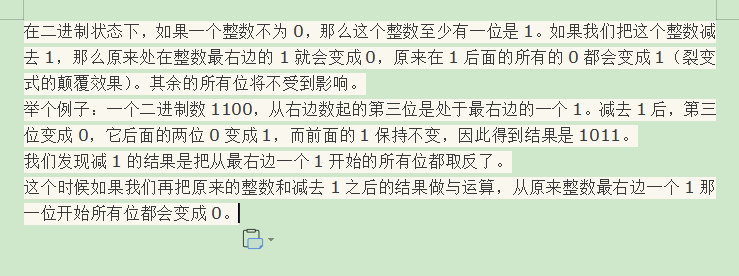
#include <bits / STDC ++ H.>
the using namespace STD;
int n-;
int getBits1 (n-int) // binary number is obtained in the form of a number 1.
{
int RES = 0;
the while (n-)
{
IF ( n-& 1) RES ++;
n->> = 1;
}
return RES;
}
int getBits2 (int n-)
{
int RES = 0;
the while (n-)
{
RES ++;
n-= n-& (n--1); // time erasing a 1 Oh
}
return RES;
}
int main ()
{
the while (n->> CIN)
{
COUT << getBits1 (n-) << "" << getBits2 (n-) << endl;
}
return 0;
}
//. 1. 1 = 1
// 2 = 101
@ 3 = 112
// 4 = 1001
topic:
For 2 non-negative integers x and y, f(x, y) is defined as the number of different bits in the binary format of x and y. For example, f(2, 3)=1,f(0, 3)=2, f(5, 10)=4. Now given 2 sets of non-negative integers A and B, for each integer b in B, you should find an integer a in A such that f(a, b) is minimized. If there are more than one such integer in set A, choose the smallest one.
Input:
The first line of the input is an integer T (0 < T ≤ 100), indicating the number of test cases. The first line of each test case contains 2 positive integers m and n (0 < m, n ≤ 100), indicating the numbers of integers of the 2 sets A and B, respectively. Then follow (m + n) lines, each of which contains a non-negative integers no larger than 1000000. The first m lines are the integers in set A and the other n lines are the integers in set B.
Output:
For each test case you should output n lines, each of which contains the result for each query in a single line.
样例输入:
2 2 5 1 2 1 2 3 4 5 5 2 1000000 9999 1423 3421 0 13245 353
样例输出:
1 2 1 1 1 9999 0
#include<bits/stdc++.h>
using namespace std;
int f(int n)
{
int res=0;
while(n)
{
res++;
n=n&(n-1);
}
return res;
}
int main()
{
int a[105];
int T,n,m,i,j,k,minn,b,t;
scanf("%d",&T);
while(T--)
{
scanf("%d%d",&n,&m);
for(i=0;i<n;i++) scanf("%d",&a[i]);
for(i=0;i<m;i++)
{
scanf("%d",&b);
minn=f(a[0]^b);
k=0;
for(j=1;j<n;j++)
{
t=f(a[j]^b);
if(minn>t || minn==t&&a[k]>a[j])
{
minn=t;
k=j;
}
}
printf("%d\n",a[k]);
}
}
return 0;
}